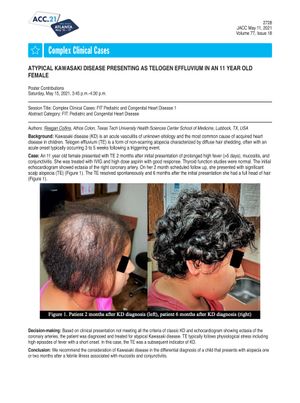Atypical Kawasaki Disease Presenting as Telogen Effluvium in an 11-Year-Old Female
May 2021
in “
Journal of the American College of Cardiology
”

TLDR An 11-year-old girl with Kawasaki disease experienced hair loss that improved after treatment.
An 11-year-old female patient developed telogen effluvium (TE), a type of non-scarring alopecia characterized by diffuse hair shedding, two months after experiencing symptoms consistent with atypical Kawasaki disease (KD), which included prolonged high fever, mucositis, and conjunctivitis. Despite not meeting all the criteria for classic KD, the patient was diagnosed with atypical KD based on her clinical presentation and an echocardiogram that showed ectasia of the right coronary artery. She was treated with intravenous immunoglobulin (IVIG) and high-dose aspirin, which led to a good response. The TE resolved spontaneously, and six months after the initial KD presentation, the patient had a full head of hair. The case suggests that Kawasaki disease should be considered in the differential diagnosis for a child presenting with alopecia one or two months after a febrile illness associated with mucositis and conjunctivitis.




